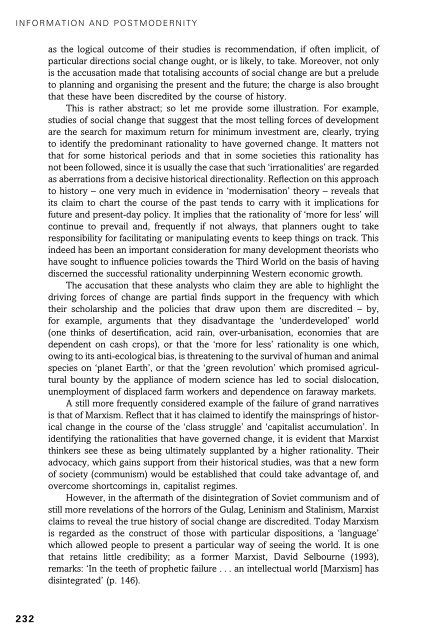Theories of the Information Society, Third Edition - Cryptome
Theories of the Information Society, Third Edition - Cryptome
Theories of the Information Society, Third Edition - Cryptome
You also want an ePaper? Increase the reach of your titles
YUMPU automatically turns print PDFs into web optimized ePapers that Google loves.
INFORMATION AND POSTMODERNITY<br />
as <strong>the</strong> logical outcome <strong>of</strong> <strong>the</strong>ir studies is recommendation, if <strong>of</strong>ten implicit, <strong>of</strong><br />
particular directions social change ought, or is likely, to take. Moreover, not only<br />
is <strong>the</strong> accusation made that totalising accounts <strong>of</strong> social change are but a prelude<br />
to planning and organising <strong>the</strong> present and <strong>the</strong> future; <strong>the</strong> charge is also brought<br />
that <strong>the</strong>se have been discredited by <strong>the</strong> course <strong>of</strong> history.<br />
This is ra<strong>the</strong>r abstract; so let me provide some illustration. For example,<br />
studies <strong>of</strong> social change that suggest that <strong>the</strong> most telling forces <strong>of</strong> development<br />
are <strong>the</strong> search for maximum return for minimum investment are, clearly, trying<br />
to identify <strong>the</strong> predominant rationality to have governed change. It matters not<br />
that for some historical periods and that in some societies this rationality has<br />
not been followed, since it is usually <strong>the</strong> case that such ‘irrationalities’ are regarded<br />
as aberrations from a decisive historical directionality. Reflection on this approach<br />
to history – one very much in evidence in ‘modernisation’ <strong>the</strong>ory – reveals that<br />
its claim to chart <strong>the</strong> course <strong>of</strong> <strong>the</strong> past tends to carry with it implications for<br />
future and present-day policy. It implies that <strong>the</strong> rationality <strong>of</strong> ‘more for less’ will<br />
continue to prevail and, frequently if not always, that planners ought to take<br />
responsibility for facilitating or manipulating events to keep things on track. This<br />
indeed has been an important consideration for many development <strong>the</strong>orists who<br />
have sought to influence policies towards <strong>the</strong> <strong>Third</strong> World on <strong>the</strong> basis <strong>of</strong> having<br />
discerned <strong>the</strong> successful rationality underpinning Western economic growth.<br />
The accusation that <strong>the</strong>se analysts who claim <strong>the</strong>y are able to highlight <strong>the</strong><br />
driving forces <strong>of</strong> change are partial finds support in <strong>the</strong> frequency with which<br />
<strong>the</strong>ir scholarship and <strong>the</strong> policies that draw upon <strong>the</strong>m are discredited – by,<br />
for example, arguments that <strong>the</strong>y disadvantage <strong>the</strong> ‘underdeveloped’ world<br />
(one thinks <strong>of</strong> desertification, acid rain, over-urbanisation, economies that are<br />
dependent on cash crops), or that <strong>the</strong> ‘more for less’ rationality is one which,<br />
owing to its anti-ecological bias, is threatening to <strong>the</strong> survival <strong>of</strong> human and animal<br />
species on ‘planet Earth’, or that <strong>the</strong> ‘green revolution’ which promised agricultural<br />
bounty by <strong>the</strong> appliance <strong>of</strong> modern science has led to social dislocation,<br />
unemployment <strong>of</strong> displaced farm workers and dependence on faraway markets.<br />
A still more frequently considered example <strong>of</strong> <strong>the</strong> failure <strong>of</strong> grand narratives<br />
is that <strong>of</strong> Marxism. Reflect that it has claimed to identify <strong>the</strong> mainsprings <strong>of</strong> historical<br />
change in <strong>the</strong> course <strong>of</strong> <strong>the</strong> ‘class struggle’ and ‘capitalist accumulation’. In<br />
identifying <strong>the</strong> rationalities that have governed change, it is evident that Marxist<br />
thinkers see <strong>the</strong>se as being ultimately supplanted by a higher rationality. Their<br />
advocacy, which gains support from <strong>the</strong>ir historical studies, was that a new form<br />
<strong>of</strong> society (communism) would be established that could take advantage <strong>of</strong>, and<br />
overcome shortcomings in, capitalist regimes.<br />
However, in <strong>the</strong> aftermath <strong>of</strong> <strong>the</strong> disintegration <strong>of</strong> Soviet communism and <strong>of</strong><br />
still more revelations <strong>of</strong> <strong>the</strong> horrors <strong>of</strong> <strong>the</strong> Gulag, Leninism and Stalinism, Marxist<br />
claims to reveal <strong>the</strong> true history <strong>of</strong> social change are discredited. Today Marxism<br />
is regarded as <strong>the</strong> construct <strong>of</strong> those with particular dispositions, a ‘language’<br />
which allowed people to present a particular way <strong>of</strong> seeing <strong>the</strong> world. It is one<br />
that retains little credibility; as a former Marxist, David Selbourne (1993),<br />
remarks: ‘In <strong>the</strong> teeth <strong>of</strong> prophetic failure . . . an intellectual world [Marxism] has<br />
disintegrated’ (p. 146).<br />
232
















